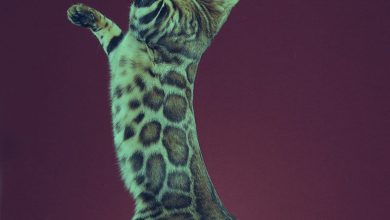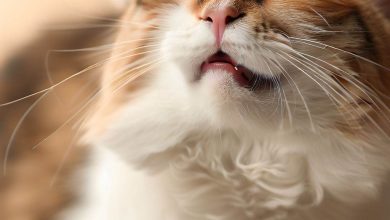Why Cats May Attack Pregnant Women

Welcoming a new addition to the family is an exciting time, but if you’re a cat owner who’s also expecting a baby, you might have some concerns about how your furry friend will react.
Don’t worry, though! With some understanding and preparation, you and your cat can peacefully coexist during your pregnancy. Let’s dive into some tips for creating a harmonious environment for both you and your feline companion.
Cats may attack pregnant women due to hormonal changes, stress, anxiety, or fear associated with the pregnancy. Additionally, cats may react to changes in their owner’s scent, appearance, or behavior during pregnancy, leading to defensive or aggressive behavior.
Understanding Feline Instincts
As much as we love our cats, it’s important to remember that they’re still animals with natural instincts. Cats are known for their hunting prowess and territorial behavior.
During pregnancy, some cats may become more protective of their space, leading to potential aggression towards other animals or even their human caregivers. This can be especially true if your cat is used to being the center of attention and suddenly has to share the spotlight with a new baby.
Anxiety and Stress
Just like humans, cats can experience anxiety and stress, and these emotions can sometimes trigger aggressive behaviors. Pregnancy can be a stressful time for both you and your cat. Hormonal changes in your body and changes to your daily routine can affect your cat’s behavior.
Cats are sensitive to changes in their environment, so it’s essential to be aware of any signs of stress or anxiety in your cat, such as excessive grooming, hiding, or aggression.
Also read: Can Cats See Fire Flames?
Physical Changes
As your pregnancy progresses, your body will go through physical changes that may impact your interactions with your cat. As your belly grows, you may find it uncomfortable to bend down or lift heavy objects, including your cat.
This can affect how you handle and interact with your cat, and your cat may pick up on these changes. It’s essential to be mindful of how you interact with your cat and avoid any physical discomfort that could trigger a defensive response.
Past Experiences
Cats have memories, and past experiences can shape their behavior. If your cat has had negative experiences with children or babies in the past, they may be more likely to exhibit aggressive behavior during your pregnancy. It’s crucial to be aware of your cat’s history and any triggers that may cause them to become anxious or aggressive.
If your cat has had negative experiences with children, it’s essential to take extra precautions and provide positive reinforcement to create positive associations with your baby.
Also Read: Can You Feed Your Dog Supermarket Meat?
Importance of Socialization
Socialization is a critical aspect of a cat’s behavior. Cats that are well-socialized from a young age are more likely to be comfortable around people, other animals, and new experiences. If you’re planning to have a baby and currently own a cat, it’s important to socialize your cat with babies and young children, if possible.
This can include exposing your cat to baby sounds, and scents, and handling it in a positive and controlled environment. Gradual exposure can help your cat acclimate to the new sights, sounds, and smells associated with a baby and reduce the likelihood of aggressive behavior.
Also Read: What is Acepromazine and How is it Used in Veterinary Medicine?
Proactive Measures
To ensure a harmonious coexistence with your cat during pregnancy, here are some proactive measures you can take:
Maintain a consistent routine: Cats thrive on routine, so try to maintain a consistent feeding, playtime, and bedtime schedule to reduce stress and anxiety.
Provide enrichment and outlets for the energy
Keeping your cat mentally and physically stimulated can help prevent boredom and reduce aggressive behavior. Provide toys, scratching posts, and perches for your cat to climb and play.
Create a safe spaceDesignate a safe space for your cat where they can retreat when they feel stressed or overwhelmed. This can be a separate room or a designated area with their bed, toys, and food.
Avoid punishment or yellingPunishment or yelling can increase stress and anxiety in your cat, leading to defensive or aggressive behavior. Instead, use positive reinforcement techniques, such as treats, praise, and playtime, to encourage desired behaviors.
Involve your cat in baby preparations
Allow your cat to explore and sniff baby-related items, such as baby clothes, blankets, and toys, to familiarize them with the baby’s scent before the baby arrives. This can help your cat adjust to the new smells associated with a baby.
Seek veterinary advice
If you have any concerns about your cat’s behavior during your pregnancy, don’t hesitate to consult your veterinarian. They can provide guidance on managing your cat’s behavior and offer solutions tailored to your specific situation.
Consider hiring a professional behaviorist
If your cat is showing persistent signs of aggression or stress towards your pregnancy, it may be beneficial to seek the help of a professional cat behaviorist. They can assess your cat’s behavior and provide customized behavior modification techniques to address any issues.
Remember, it’s important to be patient and understanding with your cat during this time of transition. Cats are creatures of habit and may take some time to adjust to the changes associated with pregnancy.
Enjoying the Journey
Welcoming a new baby into your family is an exciting adventure, and with proper preparation and understanding of your cat’s behavior, you can ensure a smooth and harmonious coexistence between your cat and your baby.
Remember to take proactive measures, involve your cat in baby preparations, and seek professional advice if needed. With patience, love, and attention to your cat’s needs, you can create a positive environment where your cat and your baby can thrive together. Enjoy the journey of pregnancy and parenthood with your beloved feline friend by your side!






One Comment